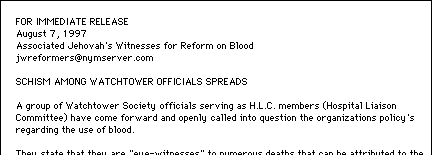
|

|
AN organized “reform” movement has announced its presence inside the Jehovah’s Witness organization — the first time such a development has occurred in recent history.
|
The shake-up that occurred in 1980 with the removal of a few Bethel headquarters workers and the expulsion of Gilead school registrar Ed Dunlap and, eventually, Governing Body member Raymond Franz, was not in response to such a reform movement. A handful of individuals had expressed to each other in private some doubts or questions concerning the Watchtower Society’s official teaching on the “great crowd.” Some of them had gotten together informally for Bible study, as other groups of friends at headquarters often did—with no subversive or political intent. They were surprised and flabbergasted when paranoia swept over the Governing Body and an inquisition was mounted against them. (Read the details in Franz’s book Crisis of Conscience.) Similarly, when I was disfellowshipped in 1982 for publishing the first two or three issues of Comments from the Friends under the pen name “Bill Tyndale, Jr.,” interrogations by judicial committees in other localities revealed that the Society feared a widespread underground movement had sprung up. Interrogators were asking suspected apostates whether they were part of “the Tyndale group.” In actuality, however, my wife and I had not made contact with any other dissidents. I was writing Comments alone, and we were avoiding a local postmark by driving to post offices across the Connecticut and Rhode Island lines, and by sending bundles to distant postmasters for re-mailing with the “Bethlehem” (Pennsylvania) and “Truth-or-Consequences” (New Mexico) postmarks. We had gone to the public library to obtain Kingdom Hall addresses from out-of-state telephone directories. |
When elders across the country began receiving copies postmarked from CT, RI, PA, NM, and MA, the Society apparently feared that Comments from the Friends was produced by a group with representatives in all these scattered places. In the headquarters episode and in our own case the leadership’s response to a handful of friends and to a single married couple proved vastly out of proportion to the actual threat at hand. With the heavy-handed brutality of a Stalinist Kremlin purge, judicial committees interrogated terrified acquaintances of the accused, looking for any shred of evidence—an offhand remark, a careless expression—that would appear incriminating. The new “reform” movement Today, however, the inner circle at Brooklyn Bethel has real reason for concern. A widespread movement has indeed sprung up to challenge the organization’s rulings on the medical use of blood and blood products. A number of elders in opposition have now been joined by Hospital Liaison Committee Members—the very ones responsible for enforcing the medical doctrines. They are publishing volumes of well-researched material on the Internet and have begun sending out professional-looking news releases to the media. |
The Internet is not merely their chosen channel of publication. It is actually the catalyst that has made the JW reform movement possible. Coming together anonymously in “chat rooms” and “e-mail lists,” unhappy members from all over the world began encountering others who were troubled by the same inconsistencies in the organization’s official teachings. Shielded by eight-character usernames like “brotherX” and “sister07” they started saying things they would never have dared voice to others in their local Kingdom Hall. And they heard the same thoughts echoed by other JWs online. Booted off some of the chat rooms by hard-line JW moderators, they began e-mailing each other privately—and setting up public forums of their own. Web pages went up like distress flares, widely-visible signals that could be spotted by additional isolated disgruntled members everywhere. Much like the Watchtower Bible and Tract Society’s “official” website at www.watchtower.org, the reformers’ articles published on the Internet include translations in the German, Spanish, Swedish, Japanese, and Portuguese languages, with notations indicating that Polish and Finnish versions are also in the works. This multi-lingual character of the reform movement testifies to its growing support among Witnesses. What are they saying? The JW reformers appear to be chiefly concerned with the issues surrounding blood —the Watchtower leadership's arbitrary rulings that spell death for many JWs and their children. This is the primary focus of their website, the chief means they are using to publish |
Copyright © 1997 by David A. Reed, all rights reserved. Clipart copyright © by Corel Corp., Metro Creative Graphics, Inc., Metro ImageBase, Inc., T/Maker, Zedcor, Inc., et al., used with permission.